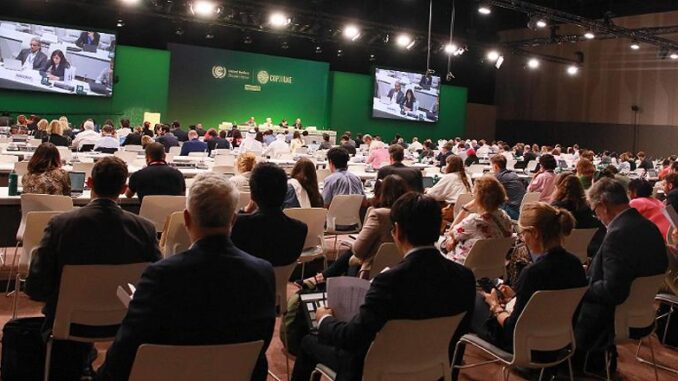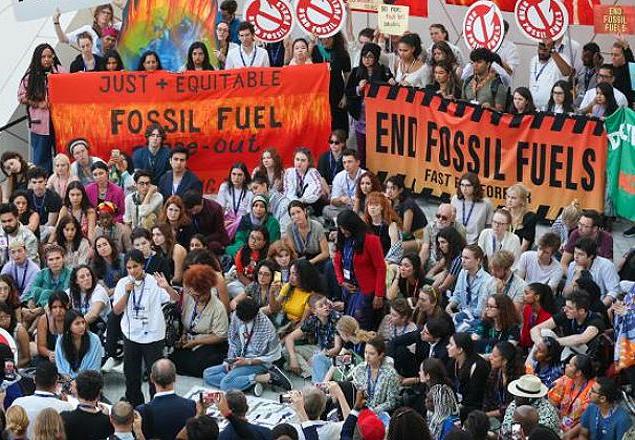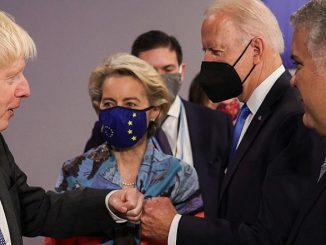
DUBAI, United Arab Emirates, December 12, 2023 (ENS) – It was nearly midnight on Tuesday, December 12 when all but the few tired delegates intimately involved in the high-stakes international climate talks had left the COP28 conference rooms at Expo City, Dubai. The closed-door talks would continue until 3 am Wednesday and then pause for consideration of the issues, the COP28 Presidency said.
Delegates to these annual climate conferences, convened by the United Nations climate agency to deal with the increasingly disastrous effects of climate change, know the pattern well.
The conference is scheduled, the dates are announced. The time is always too short to deal with the vast number of serious issues to be decided, and at least one more day is needed. This year, one day may not be enough time as the list of unresolved issues is contentious.
On Monday evening, COP28 President Sultan Ahmed Al Jaber opened the first part of the closing plenary of the 28th meeting of the Conference of the Parties (COP) to the UN Framework Convention on Climate Change (UNFCCC) and told parties that the “time for decisions is now.”
A few decisions were adopted there, but many outstanding issues were left hanging – most frustratingly, how to achieve an equitable fossil fuel phase out.
Parties accepted Azerbaijan’s offer to host COP29 next November, and also accepted Brazil’s offer to host COP30 in November 2025.
Mukhtar Babayev, Minister of Ecology and Natural Resources, Azerbaijan, expressed appreciation to the Eastern European region for supporting their offer to host COP29.
Marina Silva, Minister of Environment and Climate Change, Brazil, said COP30 will be held in Belem. The capital of the state of Para in the country’s north, this city of 1.4 million is the gateway to the Amazon River basin.
Minister Silva noted the symbolism of having the climate summit take place in the Amazon. She emphasized the importance of leaving COP28 with tangible results – an increase in renewable energy and reduction in fossil fuel use, and she pointed to the need to bring means of accomplishment into line with climate ambition.
Deep rifts among delegates have become clear over the past two weeks. For instance, the latest text on the first-ever Global Stocktake (GST) assessment on current progress toward limitation of climate change was met with deep concern and considered “utterly insufficient.” Many felt the text does not live up to the 1.5°C target as the “North star” of the meeting, and goes backward on ambition.
Those who had hoped that this text would call for a phase out or phase down of fossil fuels were disappointed. No such language appeared.
Instead, the GST text suggests:
- – limitations on permitting new and unabated coal power generation;
- – advancing abatement and removal technologies; and
- – “reducing” consumption and production of fossil fuels to achieve net zero “by, before, or around 2050.”
Civil society observers kept up the pressure. They demonstrated outside the conference venue, and formed a human chain to greet ministers walking towards evening talks, reminding them of their responsibility to protect the lives and livelihoods of those at home.

In response to the latest text of the Global Stocktake Kaisa Kosonen, who heads the Greenpeace COP28 delegation called the conference “a failure,” and said, “Phasing out fossil fuels is not a choice anymore!”
The text has a list of things countries might choose to do to accelerate the energy transition. While reducing both consumption and production of fossil fuels to achieve net zero around 2050 is on the list, it is only one of the many options.
Kosonen said, “This leaves the door open to a host of false solutions that will benefit the oil, gas and coal industries instead of providing a safe, fair and equitable future for all of us.”
On Tuesday, the Africa Group of Negotiators issued a statement indicating that the Group would not agree to outcomes if Africa’s priorities were not addressed. They called for an adaptation framework with ambitious time-bound targets and clear support for implementation as well as significant concessional funding towards a just transition.
The African negotiators maintain that African nations should be able to explore all their resources, including fossil fuels.
But climate protection advocate groups such as 350.org argue that such a situation that would undermine climate goals of the Paris Agreement and the calls for an equitable fossil fuel phase out at COP28.
Landry Ninteretse, Africa Regional Director with 350.org, said, “Our leaders know all too well the harm that fossil fuels do to our communities. The voices of our people who are suffering from worsening impacts of fossil fuels should serve as their guide as they navigate this process, and they must act in the interest of the people.”
“Reliance on fossil fuels not only sets us on a perilous path to further destruction but also won’t bring a tangible benefit in people’s lives and livelihoods. Fairness and differentiation are key to this energy transition,” he said.
“Our continent is abundant in renewable energy resources that, if developed, can address the continent’s dual energy and climate crises. Neo-colonialist and extractivist approaches that have long characterized the fossil fuel exploitation must stop. Rather than fight to explore polluting fossils, focus should be on calling for developed nations to deliver adequate and favorable financing towards a fast and fair transition away from fossils,” Ninteretse said.
The fossil fuels phase out debate was central to many discussions at COP28.
COP28 President Al Jaber told delegates that the “Changemakers Majlis” he convened on Sunday, December 10, had brought “a new tone and spirit of cooperation,” to the conference, and he encouraged parties to work collaboratively to keep 1.5°C in reach. Majlis is the Arabic word for a sitting room and also for an Islamic council, or parliament.
The Arabic group Green Future defines it by explaining, “The majlis – or sitting place – brings people together from all ages and backgrounds to discuss shared interests in the community. The majlis serves an important role both in the home and for business meetings in the UAE and the Arab world.”
The gathering seemed to evoke a more personal, emotional tone, and confidences were shared.
The South African representative said her country has received less than 10 percent of the support needed to implement its ambitious Nationally Determined Contribution, NDC, and noted that “there is no ambition gap, but rather a means of implementation gap.”
The Marshall Islands rep explained that, if nothing is done by 2040, citizens in his country will be forced to relocate, which means abandoning their homes, culture, and ancestors.
The Australian rep emphasized aligning NDCs with the Paris Agreement’s target of keeping global warming to 1.5°C above preindustrial levels, and stressed the importance of tripling renewable energy, doubling energy efficiency, and ensuring fossil fuels have no ongoing role.
When the COP28 closing meetings will resume is still unclear, but when they do, delegates are expected to make a laundry list of important choices that will determine the level of human exposure to the ravages of climate change for centuries to come.
Featured image: Delegates at COP28, Expo Dubai, United Arab Emirates, December 12, 2023 (Photo by IISD/ENB | Mike Muzurakis)
© 2023, Environment News Service. All rights reserved. Content may be quoted only with proper attribution and a direct link to the original article. Full reproduction is prohibited.



